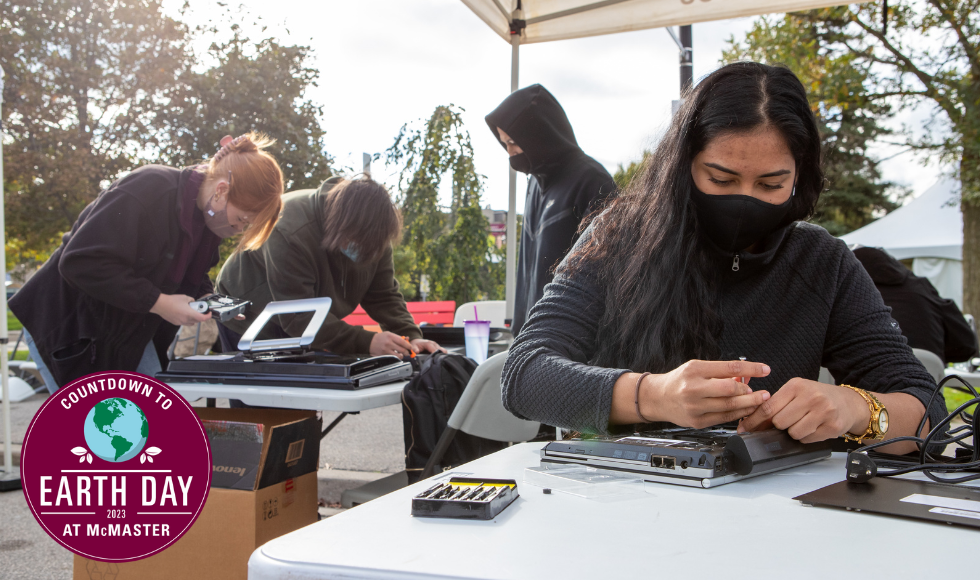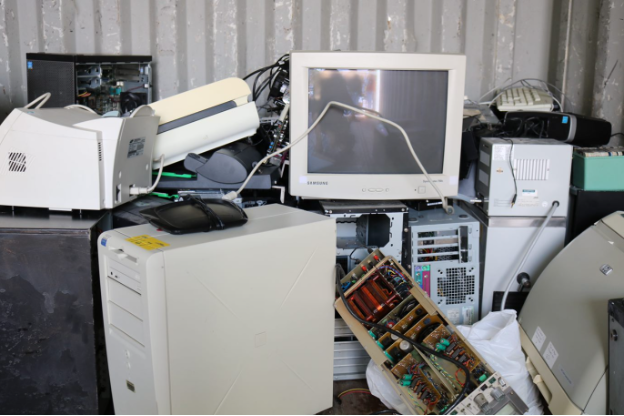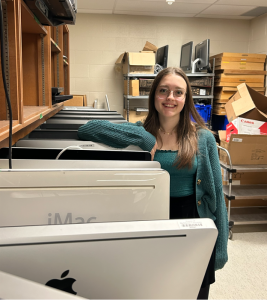ACCESS Tech donuts for donation drive back on campus

McMaster students working at an ACCESS Tech donation event in October 2021. (Photo by Matt Clarke/McMaster University).
Got old electronics? Not sure what to do with that device? Bring it by the ACCESS Tech donation drive on April 21st on the BSB lawn.
You’ll also tidy up your space, get free hard drive sanitization, help someone in need, give your computer another life, and score a donut in the process.
ACCESS Tech is the university’s initiative for IT collection, reuse and donation. Students and staff work with community partners to get refurbished technology to Hamiltonians in need.
And thanks to some sustainability student researchers, organizers can not only make the event more user friendly, but can also help other universities create similar programs.
The student researchers set out to study what motivates people to donate technology, what motivates students to upcycle technology and how McMaster can set a path to sustainability for other universities to follow.
Here are some of their findings and what it means for McMaster and the ACCESS Tech initiative.
What’s behind the why (it’s more than the free donuts)
Four students from SUSTAIN 4S06 – Leadership in Sustainability describe their process to answering this question.
“We attended the fall ACCESS Tech donation event and interviewed 20 people who had donated technology. We asked them questions to understand their experience and why they donated,” says Mehakpreet Sandhu (Science).

“From our interviews, we found that people were motivated for personal reasons, like cleaning up their personal space, as well as for altruistic reasons, like helping others in need and the environment,” says Sanjoli Saini (Science).
“In addition to finding out what motivates people, we also heard a lot about the things that facilitated the donation process, like the event being in a central location, and we also heard that the free donuts were a nice touch,” says Devanshi Patel (Science).
“We made suggestions from our findings, and now we have a unique opportunity to action some of our recommendations during the April 21st collection event, like seeking tech donations from students — who also have things to donate — and amplifying the donuts as a fun and tasty way to thank those who donate. We’re really curious to see if there is an increase in donations as a result,” says Edward Kang (Engineering).
Secondhand. Second life.
Another group of SUSTAIN 4S06 students set out to uncover what motivates students to upcycle technology, or take something no longer in use and give it a second life. Here’s what they discovered:

“For our project we interviewed 21 students who attended the ACCESS Tech student upcycling event and we found that students are curious to see what free technology is available that they might be able to fix or find another use for,” says Alison Laurie (Social Sciences).
“One of our main recommendations was to expand our collective perspective about what we think is ‘usable IT’, because the student upcyclers were doing some amazing things with items that we thought were useless,” says Carmen Huynh.
“A few students took home solid state drives — a type of PC storage drive — to install operating systems like Linux, which is a free and accessible alternative to Windows and iOS,” says Huynh.
“In addition to being a really smart idea, I think it highlights the core values behind the ACCESS Tech initiative.”
Project team members also include Shanathan Selliah (Science), Derek Zhang (Engineering) and Summer Akhtar (Science).
Setting a path to sustainability for others to follow
Emilia Nietresta is a fourth-year student taking part in the Sustainability Internship Program as a way to enhance the experiential nature of the Engineering Inquiry Project. Nietresta shares her initial curiosity and what she ended up learning:

“I started out looking to understand sustainable Canadian IT waste management efforts, which led me to narrow my research to explore how other universities are managing their IT waste. I found out that other schools focus on IT recycling, but I could not find another school within my scope that had a program for reuse or donation,” says Nietresta.
“I created a taxonomy that would identify different stages of progress and that would help other schools move from IT recycling to IT reuse, just like McMaster did.”
“In the future, I hope we can also have a program or policy where we only buy technology of a modular design so that it’s easy for anyone to replace a part, rather than buying a whole new device.”
Upcoming ACCESS Tech Drive
McMaster will be hosting the next ACCESS Tech donation drive on April 21st from 11:00am to 1:00pm on BSB lawn. There will be Donut Monster donuts for those who donate. More information can be found here.



